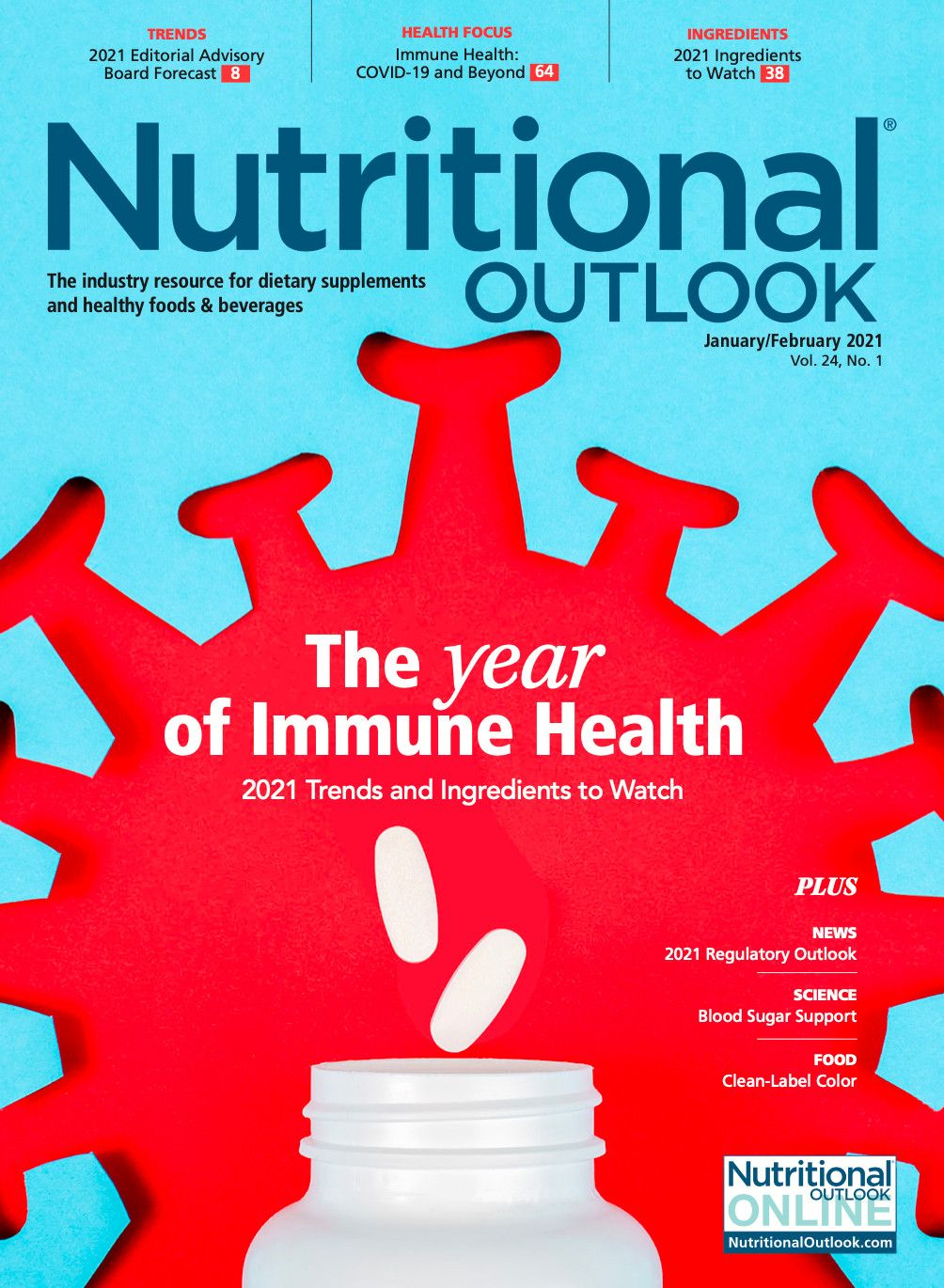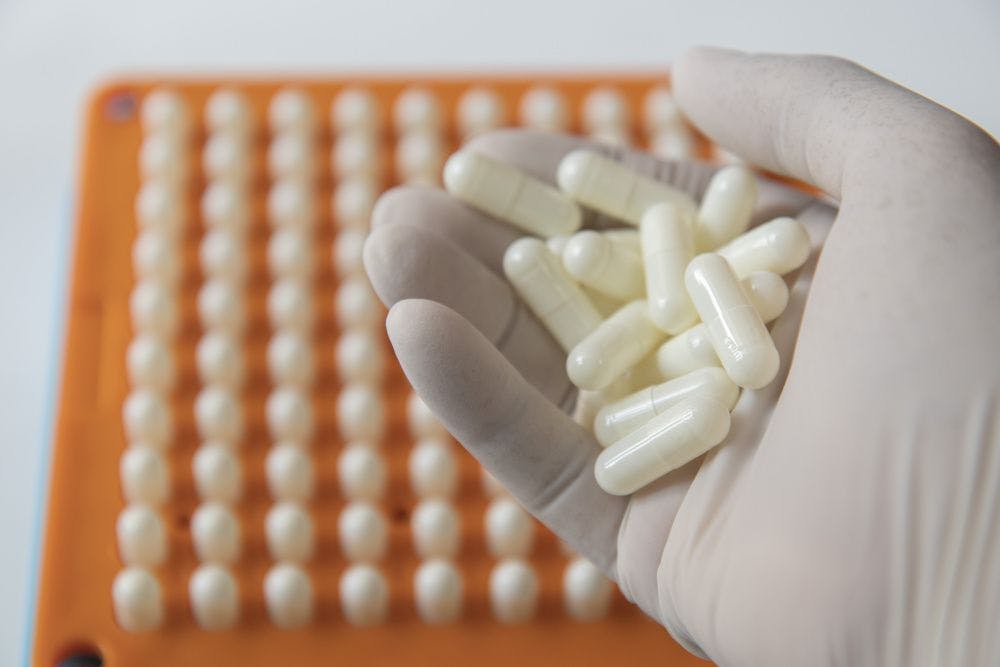2021 Regulatory outlook for dietary supplements, functional foods, and natural products
Dietary supplement industry associations and leaders share 2021 regulatory predictions.
Photo © AdobeStock.com/enjoys25

The U.S. dietary supplement, functional food, and natural products industries face a number of regulatory uncertainties as 2021 kicks off with a new U.S. administration, an ongoing global pandemic, and more. We asked industry associations and group leaders to discuss the possibilities.
Nutritional Outlook: What impact could the new U.S. administration have on the dietary supplement industry?
Christine Burdick-Bell, Steering Committee Chair, Dietary Supplements Quality Collaborative (DSQC):
Christine Burdick-Bell

Former Food and Drug Administration (FDA) Commissioner Scott Gottlieb and the outgoing administration rightly recognized that Congress last updated the Dietary Supplement Health and Education Act (DSHEA) 25 years ago. While we are unable to predict the priorities of the agency until the new FDA commissioner is confirmed by the Senate, the Dietary Supplements Quality Collaborative (DSQC) is hopeful the incoming new administration will also recognize the need to modernize the legal and regulatory framework to both preserve consumer access and increase consumer safety. Because industry grew from $4 billion with roughly 4,000 products to $40 billion with over 50,000 products over the past 25 years, it is imperative modernization efforts promote safety, advance transparency, and begin to embrace new and innovative mechanisms that ensure greater supplement quality.
As history shows, Democratic administrations tend to favor a more robust regulatory environment, and we anticipate the FDA as well as the Federal Trade Commission (FTC) to increase regulatory oversight and enforcement. Additional regulatory oversight could be favorable to both consumers and responsible actors within the industry, although the overall impact of that oversight will largely depend on the modifications that the agencies make first and the methods they will use to implement their actions.
Daniel Fabricant, PhD, Executive Director and CEO, Natural Products Association (NPA; Washington, DC):
Daniel Fabricant, PhD

We’re very hopeful that a new administration is interested in keeping FDA accountable specific to dietary supplements. We understand that COVID is still a big part of their lift; still, there needs to be better accounting of actions (warning letters, legal actions, inspections, etc.) and specific outcomes tied to those actions. E.g., If a firm has been inspected twice and is OAI (Official Action Indicated) both times, what is the plan to bring those companies into compliance?
Loren Israelsen, President, and Larisa Pavlick, Vice President of Global Regulatory and Compliance, United Natural Products Alliance (UNPA; Salt Lake City, UT):
Loren Israelsen

Larisa Pavlick

Currently the nation and the world are focused on COVID-19. We believe the new administration will likely continue to focus on slowing the pandemic, drug approvals, and vaccine distribution. The likelihood that food and supplements will be a priority to the new administration is unlikely until we see improvement with the global pandemic.
At the time of preparing this article, the Georgia runoff elections had not occurred, and therefore the impact of the new Congress and administration had not been fully understood or realized. Once we see the results of these runoff elections, and their impact on the Hill, we can make better predictions. However, with any new president, we will see appointments to many key positions, including the secretary of Health and Human Services (HHS) and the FDA commissioner.
On December 7, The New York Times reported President-elect Biden’s selection of Xavier Becerra, currently attorney general of California, as nominee for secretary of Health and Human Services. This comes as quite a surprise to UNPA, as Mr. Becerra’s background is legal and legislative. Traditionally the secretary of HHS would bring a medical or healthcare background. Why is this of importance? Because this would likely make the selection of an FDA commissioner even more important—i.e., someone with deep FDA experience—if the HHS secretary has little experience working with FDA.
The FDA commissioner appointment is expected to be made quickly due to the current health crisis around COVID-19; however, it will likely occur weeks after President-elect Biden takes office. As a previous barometer, during the past two administrations, the new commissioner was nominated in May.
After the key positions are filled, we feel the FDA’s top priorities will likely be focused on Emergency Use Authorizations and continued efforts related to the vaccine for COVID-19.
By the second half of 2021, pending improvements with the current pandemic, we might anticipate attention to the modernization of the Dietary Supplement Health and Education Act (DSHEA) of 1994, potential legislation for hemp-derived cannabidiol (CBD) as a dietary supplement, emphasis on pesticide use in food, and for continued discussions on the labeling for added sugars in foods. These predictions are based on topics of interest in the final 2020 Congressional action on budget/COVID approved by Congress on December 21, 2020, and the FY2021 Appropriations Conference Report.
As reported by Rachana Pradhan [at] Kaiser Health News, and MSN, per the FDA policy until the new commissioner is appointed, all duties and responsibilities will be conducted by an acting commissioner. Within FDA policies, the acting commissioner will be held by the deputy commissioner for Food Policy and Response. This position is currently held by Frank Yiannas.
Mr. Yiannas is from industry, and he is not from the FDA. He brings a needed industry perspective to the table, which we welcome. He was formerly with Walmart as the vice president of food safety (10 years), and prior to Walmart was the director of safety and health for Walt Disney World Co. for 19 years. He is highly respected by the industry for his background and education. Mr. Yiannas has experience with food safety, Hazard Analysis Critical Control Point (HACCP), traceability, and outbreak response.* We predict any FDA attention during Mr. Yiannas’s time as acting commissioner will be focused on these areas of expertise. (*Referenced from LinkedIn profile)
Michael McGuffin, President, American Herbal Products Association (AHPA; Silver Spring, MD):
Michael McGuffin

Every regulated industry recognizes the need for increased vigilance whenever the Democrats are in charge of the White House and both Houses of Congress. The Democrats are more prone to propose new regulations since they are, as a rule, more protective of consumers and more willing to place more burdens on industry if they think that supports consumers.
Focused just on the history of food and drug law, the last time the Democrats were in charge of all the levers of government the Congress passed the Food Safety Modernization Act in 2010 (signed into law in January 2011). This law is, in FDA’s words, “the largest overhaul of the nation’s food safety system since the Federal Food, Drug and Cosmetics Act of 1938.” It completely changed the way foods are regulated and moved FDA’s authority all the way back to the farms on which produce is grown.
Looking forward and focused just on dietary supplements, FDA has made it clear it wants to require mandatory product registration for all dietary supplement products. The agency frames this interest in the context of solving the international problem of drug-spiked products that masquerade as dietary supplements, at least in the U.S. So it’s likely that FDA will be working with the Congress to try to gain support for this new authority.
Of peripheral interest is that Senator Richard Durbin (D-IL) and Representative Rosa DeLauro (D-CT)—both Democrats and both dietary supplement critics—have regularly introduced legislation since 1999 that would redefine FDA as the “Federal Drug Agency” and create a new federal agency to oversee all food operations—now split between FDA and USDA. It will be interesting to see if this idea gains more support in the current Congress—and if it does, where supplements would fit in the envisioned new structure.
Steve Mister, President and CEO, Council for Responsible Nutrition (CRN; Washington, DC):
Steve Mister

CRN is optimistic about working with the new administration. We especially look forward to the appointment of the new FDA commissioner to further strengthen the dietary supplement industry and to modernize FDA’s oversight of these products. It will be critical that the new commissioner maintain the balance DSHEA struck in 1994 between preserving consumer access and assuring consumer safety. This balance, along with FDA’s regulatory oversight, has helped the industry to grow and has built the vibrant marketplace that exists today.
John P. Troup, PhD, Vice President, Scientific Affairs and Dietary Supplements, Consumer Healthcare Products Association (CHPA; Washington, DC):
John P. Troup, PhD

Things are at a turning point for dietary supplements. The 25th anniversary of DSHEA has come and gone, but the momentum behind DSHEA modernization is ongoing and must continue into the next term. CHPA looks forward to working with the Biden administration on ensuring the country has a modernized regulatory system overseeing the rapidly expanding dietary supplements category. This is an important public health issue that transcends political parties and election results. CHPA has observed firsthand with OTC monograph reform that FDA and Congress are able to jointly tackle comprehensive legislation addressing important regulatory matters, despite which party is in the White House or holds majority in Congress. We’re hopeful that we will see sustained momentum behind dietary supplements regulatory and legislative efforts over the next few years.
Nutritional Outlook: In 2021, do you expect to see developments at FDA’s Office of Dietary Supplement Programs (ODSP) regarding major regulatory issues?
Christine Burdick-Bell, Dietary Supplements Quality Collaborative (DSQC):
The FDA’s Office of Dietary Supplement Programs (ODSP) has worked hard to develop trust with the industry over the years. Although we are still awaiting the next FDA commissioner, we can expect continued forward developments through ODSP in 2021, particularly since the Food and Drug Administration (FDA) has shown interest in taking on major regulatory challenges during the current administration.
The first half of 2021 (and possibly even longer), the FDA’s focus will remain on COVID-19–related priorities. However, we hope that by the end of the year, work will progress in developing proposals to modernize dietary supplement regulations.
DSQC is especially hopeful there will be developments in establishing and implementing a mandatory product listing (see the DSQC’s policy principles), which is crucial for enhancing market transparency and ensuring consumer safety in an industry that is growing at a rapid pace. Overall, the DSQC will advocate for additional resources in the form of funding and enforcement tools that can aid the agency in ensuring safety in the market, including legislative clarification of FDA’s regulatory authority over the dietary supplements industry.
Daniel Fabricant, PhD, Natural Products Association (NPA):
We don’t know. We saw so little activity this past year. I mean, we were all clamoring for CBD to be resolved. It wasn’t. We were clamoring for this import issue to be resolved. It wasn’t. FDA’s activity lately has not been good, frankly speaking. They haven’t been strong on things we need them to be strong on. We’d like to see that change—but we don’t want to see overreach. It was kind of amazing to me, and I think to our board members this year, that you had FDA saying, “We need new authorities. We need more information.” Meanwhile, we give them information, and they wouldn’t use it. They want product labels. Meanwhile, we gave them product labels all the way through the supply chain in terms of adulterated ingredients coming from overseas, and they did nothing with it. So for us, that’s like, “Wait a second. You want more information. We gave you more information. You did absolutely nothing with it.”
I think anybody who tells you they know what’s going to happen is not being honest. I don’t think anybody knows. The bigger problem is I don’t think FDA knows. That’s really the bigger issue. In a lot of ways, FDA’s used a lot of different excuses this year—my dog ate my homework. We’re glad to see inspections back up and running, but there really hasn’t been any discussion on what that means, what that entails, and how the gaps are being filled. The agency at some point needs to be a lot more transparent, and I hope that’s what happens in 2021, but I don’t have a good feeling about that.
Loren Israelsen and Larisa Pavlick, United Natural Products Alliance (UNPA):
Once the new administration completes their appointment for the FDA commissioner, we may see some focus on individual FDA offices like the ODSP. We believe resources are the greatest challenge for this office. They have less than 30 employees, and they are responsible for regulating a huge industry with remarkably diverse products. Statistics from the FDA regarding Good Manufacturing Practices (GMP) establishment inspections indicate less than 20% of the industry is being audited by the agency each year. At the current growth rate of the industry, the agency just cannot keep up. Funding and adequately trained staff are crucial to the efficient and effective enforcement of the Federal Food, Drug, and Cosmetic Act and the Dietary Supplement Health and Education Act (DSHEA).
We have been anticipating the modernization of DSHEA for some time. The rumor and hints of shifting regulation have been present for several years. At UNPA, we continue to watch and listen to try to keep our members informed and to represent their needs.
We believe, with our fellow trade association partners, including CHPA, AHPA, and CRN, regulatory shifts for dietary supplements may include:
- Mandatory product registration for dietary supplement products
- Additional clarification for New Dietary Ingredient (NDI) notifications, which may help encourage more industry filings
- Potential master file provisions to help protect the intellectual property for innovative ingredients. A master file system is one idea to assist compliant companies with their research and development investments related to NDI materials.
These are just a few examples or concessions from the industry in exchange for FDA enforcement of current regulation.
Just prior to the COVID outbreak, we heard rumors and rumblings of potential FDA enforcement action for NDIs in 2020. The outbreak seemed to slow or stop this progression; however, we believe if you review the language being utilized in warning letters and for regulatory action in 2020, the message seems to be on the wall. NDI enforcement is imminent and potentially includes enforcement of timely NDI notification filings with the FDA, for a complete and accurate definition of the NDI “article”, and competent review of supporting scientific data for the safe consumption of the NDI based on its intended use.
Michael McGuffin, American Herbal Products Association (AHPA):
ODSP’s interest in mandatory product registration appears to have the support of FDA’s central management, and as already mentioned, it seems likely the agency will make this a priority in the 117th Congress. This is also central to FDA’s “modernizing” efforts with regard to supplement regulations.
With regard to the ongoing attention to the regulation of New Dietary Ingredients, AHPA has long communicated that we hope FDA will not issue a third draft of NDI guidance that tries to incorporate both the actual guidance needed by industry and the agency’s more controversial statutory interpretations, and will instead focus just on those topics where better guidance is actually needed for firms that intend to market ingredients that all agree are, in fact, “new” dietary ingredients.
Steve Mister, Council for Responsible Nutrition (CRN):
CRN is hopeful that FDA’s Office of Dietary Supplement Programs (ODSP) will get renewed attention from the new commissioner to complete a number of outstanding items. We urge the agency to release final New Dietary Ingredient (NDI) guidance that offers protection for innovation and research; to establish and clarify a legal path to market for hemp-derived cannabidiol (CBD) as a dietary supplement; to implement a mandatory product listing that provides transparency for regulators and consumers alike; and to address the issues around N-acetyl-L-cysteine (NAC) and other ingredients that are shared among supplements and drugs. We will also continue to advocate for more resources for the agency to bolster enforcement of DSHEA to create a stronger and safer supplement marketplace.
John P. Troup, PhD, Consumer Healthcare Products Association (CHPA):
The increasingly rapid growth of the dietary supplement markets underscores the need for regulatory and/or legislative remedies that will ultimately help increase consumer confidence in the category. To do so, FDA needs a transparent line of sight into the market and resources to oversee it effectively, while also providing industry with the clarity it needs. CHPA has enjoyed a positive and productive collaboration with the FDA Office of Dietary Supplement Programs and looks forward to continued dialogue into 2021 and beyond regarding proposals to strengthen regulatory oversight, enact mandatory product listing, clarify the New Dietary Ingredient notification process, and establish additional resources for the office to allow increased review and inspection activity.
CHPA is hopeful that we will see movement around important dietary supplement issues in 2021 through appropriate legislative and regulatory actions. Comprehensive DSHEA modernization is necessary to provide more robust oversight and to strengthen processes supporting product safety and quality. Increased FDA resources would also help to support additional enforcement against bad actors. While this is a big undertaking, it’s critical that the dietary supplements regulatory framework meets the needs of the growing marketplace. We view mandatory product listing as a cornerstone of meaningful modernization, making it easier for FDA to identify and take quicker action against illegitimate and illegal products that may pose serious safety risks.
While these efforts are underway, we would certainly like to see FDA finalize the NDI notification guidance, which would provide clarity to industry and perhaps increase the NDI notifications submitted. CHPA also supports the proposed master file system, which would incentivize innovation, increase investment in scientific research on dietary ingredients, and reduce the incidence of copycat ingredients, for which the safety data is often unknown. Clarifying these issues through either legislative or regulatory modifications would strengthen the NDI notification process and benefit consumers, FDA, and the dietary supplements industry.
Having legislation in place in 2021 that will define the regulatory pathway for allowing hemp oil/cannabidiol (CBD) to be marketed as a dietary supplement is a key objective. Since 2019, CHPA has advocated for FDA to establish a regulatory pathway to allow the legal marketing of dietary supplements containing cannabidiol derived from hemp and to require NDI notification submissions for CBD-containing dietary supplements. We look forward to working on a final package that will bring much needed clarity to the market.
CHPA looks forward to working collaboratively with FDA and industry to identify solutions that meet the needs of the agency and ensure that consumers have access to dietary supplements that are safe, responsibly marketed, and manufactured according to GMPs.
Nutritional Outlook: Do you have any particular concerns in 2021 regarding negative issues like fraudulent supplements, companies not following supplement regulations, or companies making illegal product claims? Is there any reason concern over these issues would be higher in 2021 than in other years?
Christine Burdick-Bell, Dietary Supplements Quality Collaborative (DSQC):
Adulterated products fraudulently labeled as dietary supplements have been and continue to be a problem for the dietary supplement industry and its consumers. In 2020, the Food and Drug Administration (FDA) took record action against “bad actors” who made unsubstantiated claims about their products. One of the primary factors for this increased activity was the COVID-19 pandemic where some companies made false claims about the effectiveness of their products related to the virus and its symptoms.
Since COVID-19 will remain a primary concern in 2021, we can expect similar issues in the coming year with unscrupulous actors making unsubstantiated claims about their products fraudulently marketed as dietary supplements. Similarly, we expect the FDA will continue to take action against these companies.
The Dietary Supplements Quality Collaborative (DSQC) will continue to prioritize and advocate for increased funding for the Office of Dietary Supplement Programs (ODSP), one of the smallest divisions within the FDA despite the rapid growth of the industry, as well as the implementation of a mandatory product listing, and clarification regarding the statutory definition of dietary supplements. We believe this will provide ODSP with sufficient resources for greater enforcement and consumer protection from intentionally adulterated or misbranded products marketed as dietary supplements. Another component of our advocacy efforts is directly through consumer education with tools like this infographic to help people understand and protect themselves from such products.
Daniel Fabricant, PhD, Natural Products Association (NPA):
We’re very supportive of the efforts we’ve seen from the Federal Trade Commission on claims and substantiations. FDA, to some degree, has been good on claims. Could they be better? Sure. You know, it’s funny. People—the mainstream media—always go, “Well, the industry’s not regulated.” Meanwhile, there are more claims letters on dietary supplements written every year than there are on any other commodity, so you can’t really say it’s not regulated when that’s an area that there’s clearly action on…I mean, we’ve got 25-plus years of letters [saying] you can’t claim to cure, treat, or mitigate a disease…I think the claims piece has been relatively consistent, especially as long as you have people like Rich Cleland [assistant director, Advertising Practices, Bureau of Consumer Protection] at FTC. I think they’ve done a very good job.
Chris Gearheart, Director of Member Communications and Engagement, Global Organization for EPA and DHA Omega-3 (GOED; Salt Lake City):
Chris Gearheart

Ensuring that consumers get nutrition products they can trust is a priority and an obvious challenge during the stress imposed by the pandemic. GOED is proud of its members’ unwavering commitment to manufacture quality omega-3 supplements, pandemic or no pandemic. We also applaud Amazon’s newest efforts to clamp down on inferior or counterfeit supplements and build consumer trust.
Loren Israelsen and Larisa Pavlick, United Natural Products Alliance (UNPA):
Due to the pandemic, FDA suspended on-site regulatory inspections in about February for international firms and in about March for domestic companies. The lack of FDA inspection is not a concern for our UNPA members or for the greater responsible dietary supplement industry. We will continue to do our best to ensure the consumer has access to safe, science-based, high-quality, and GMP-compliant dietary supplement products.
Sadly, the lack of FDA inspections provides the “bad actor” with greater opportunities. Claims are the best tool for unethical brands to lure in the consumer. Without FDA oversight through inspections and investigations, the unethical players may be distributing unsafe products labeled as dietary supplements to consumers.
Unfortunately, the mass media likes to grab onto these stories and focuses negatively on “bad products” and on our industry, without much balance. These stories rarely provide facts on dietary supplement regulations, and you will often see headlines that the unethical products are “unregulated.” These stories become much bigger and more damaging than the unethical player and the bad product. It makes us all look bad, and it confuses the general consumer.
Michael McGuffin, American Herbal Products Association (AHPA):
The responsible center of the industry and the legacy brands—the kind of companies that tend to join AHPA and other trade associations—have already figured out where the line is drawn between compliance and non-compliance. Enforcement attention on companies who have not figured this out is always welcome, so long as FDA does not get creative in reinterpreting the rules that the Congress intended for supplement products in any manner that would reduce or compromise consumer access to a broad range of health promoting supplements.
Steve Mister, Council for Responsible Nutrition (CRN):
Adulterated products fraudulently labeled as dietary supplements continue to be a narrow exception, but nevertheless, serious issue facing the dietary supplement industry. We remind consumers to choose products from reputable brands they trust and from reputable retailers or online retail platforms. The public should also be wary of products promising drug-like results and obscure internet sites making over-the-top claims for their products. While the internet can be a viable option for purchasing quality supplement products, consumers should be aware that many products that are associated with contamination problems are offered exclusively through internet sites from unreliable companies. And as the pandemic significantly accelerated consumer online purchasing sales this year, FDA will need to increase its enforcement of the online marketplace to address these issues in the next year.
As the pandemic persists into 2021, we also may continue to see more companies making illegal product claims related to COVID-19. During a year where more consumers are concerned about their health, some unscrupulous companies take advantage of the crisis and make illegal and unsubstantiated drug claims that misdirect consumers and endanger public health. We encourage FDA to take strong enforcement action against products being promoted with illegal and unsubstantiated claims of prevention or treatment of COVID-19. While there is substantial research demonstrating the role supplements can play in supporting immune health, direction for prevention and/or treatment of COVID-19 should come from a qualified healthcare provider or public health authorities.
John P. Troup, PhD, Consumer Healthcare Products Association (CHPA):
In 2020, FDA issued approximately 200 warning letters and other actions against dietary supplement companies for reasons including unsubstantiated claims, mislabeled products, failure to adhere to cGMP standards, or selected distribution of adulterated raw materials and their use in finished products. While many businesses in the dietary supplements category meet or exceed FDA guidelines, gaps in regulatory compliance pose risks to consumer health and tarnish the reputation of the entire dietary supplements industry. As the dietary supplements category experiences the highest growth rate since 1997, it has become more commercially attractive, and consumer interest and use are at an all-time high. At the same time, we’ve seen more products launched with claims that lack adequate scientific substantiation. Given the high consumer interest and use, it’s more important than ever that claims are limited to structure/function statements and that the supply chain be carefully monitored.
Given increased consumer interest in the category against the backdrop of COVID-19, in 2021 FDA must remain vigilant against companies marketing fraudulent, illegal products. FDA guidelines for scientific substantiation of products should be used consistently across the industry, and both the FDA and FTC should more closely monitor the inappropriate use of claims. Similarly, safety dossiers should be on hand and made available to FDA to ensure full transparency. And given the market success in the category, we would encourage more companies to invest in research for their products that support claims of benefits.
Modernizations such as mandatory product listing could greatly enhance FDA’s ability to oversee the marketplace and to act more quickly once misbranded or adulterated products are identified.
Nutritional Outlook: FDA paused and then resumed facility inspections last year. Do you think we’ll see any changes in FDA’s capacity to inspect or regulate/enforce dietary supplement regulations in 2021 due to the COVID-19 pandemic?
Christine Burdick-Bell, Dietary Supplements Quality Collaborative (DSQC):
It is difficult to predict the Food and Drug Administration’s (FDA) capacity for inspections and enforcement of dietary supplement regulations in 2021 due to the still uncertain nature of the disease and related variables, such as availability of the vaccine(s).
Since the pandemic limited in-person inspections, the FDA is partly relying on non-inspection enforcement actions such as remote regulatory assessments to evaluate compliance with manufacturing practices. The agency may utilize such methods in future emergencies, especially with newly available authority that allows the FDA to identify, detain, and refuse all FDA-regulated products originating from foreign establishments—especially those that disallowed FDA investigators immediate physical access to their facilities. As part of this authority, the agency can further leverage “quality metrics” as a supplemental or alternative inspection approach for products originating from foreign establishments, which can result in decreased inspection frequency for high-performers.
The Dietary Supplements Quality Collaborative (DSQC) also advocates for the implementation of enforcement tools, such as a mandatory product listing, to help the FDA prioritize inspections based on risk. A mandatory product listing will enable the agency to capture trends and identify unsafe products in the market using information about their ingredients, source, and labels, thus prioritizing investigations of products that pose the highest risk to consumers. This will also help the agency make more efficient allocations of limited resources for these types of enforcement actions, potentially increasing the frequency of enforcement in a rapidly growing industry.
Daniel Fabricant, PhD, Natural Products Association (NPA):
In a nutshell, no. FDA’s not going to Congress going, “Hey, can we have extra money to fill in the gaps on those inspections we didn’t do last year?” No one’s asking for that, which is very telling. I think we’ve got to understand that and move ahead as an industry and go, “Look, when it comes to product quality, FDA’s not going to get to as many facilities as we would like.” They don’t get there on the medical device side, on the drug side. We know as an industry that we’re going to have to do the heavy lift here with inspections and product quality, and we’re prepared to do that. We’ve got the first couple of audits planned for the Supplement Safety & Compliance Initiative (SSCI). So, we’re going to have to do that as an industry, and we’ll be better off for it.
Loren Israelsen and Larisa Pavlick, United Natural Products Alliance (UNPA):
We think there may be a change in the FDA approach. We have already seen the FDA ask for voluntary compliance with electronic submission of documents typically requested during an on-site establishment inspection. The idea is to allow for document review prior to an inspection and to eliminate the time necessary for an FDA employee to be on-site during this pandemic. We have asked our UNPA members to keep us posted should they receive such a request from the FDA. Currently, the regulatory policies, rules, and laws do not permit the FDA to conduct off-site (virtual) audits other than for specific circumstances. These circumstances include if there is a suspected violation of the Federal Food, Drug, and Cosmetic Act and a product is believed to be a public health risk or if the product is covered by the Food Safety Modernization Act—Foreign Supplier Verification Programs (FSVP) rule. The FSVP rule provides a provision for FDA to request documents electronically for any imported goods and to conduct a “virtual” investigation/inspection. This is a big change for everyone regulated by the FDA and especially in the dietary supplement space where nearly 80% of ingredients may be coming from overseas by some estimates.
Michael McGuffin, American Herbal Products Association (AHPA):
I have attended presentations on new approaches and options for “virtual audits” as a substitute form of inspection, and have heard support for suggestions that these developing options might both decrease the cost of inspections and allow FDA to conduct more inspections. If these optimistic views are correct, we might come to acknowledge that in all challenges we may find a silver lining!
Steve Mister, Council for Responsible Nutrition (CRN):
FDA started returning to in-person inspections in July, and we expect that will increase as the vaccine becomes more available. The agency continues to prioritize inspections based on risk and developed a rating system to assist the agency in determining when and where it is safest to conduct prioritized domestic inspections. CRN is optimistic that this year showed FDA the importance of prioritizing inspections and targeting firms most likely to have violations. We hope that this recognition carries into the agency’s 2021 enforcement priorities and encourages FDA to put resources where they are most likely to protect public health, rather than routine inspections of companies who have demonstrated a history of compliance.
John P. Troup, PhD, Consumer Healthcare Products Association (CHPA):
While COVID has affected FDA’s ability to inspect facilities in person, the agency is still doing inspections virtually and requesting companies provide data, information, and reports. The FDA ODSP budget in 2020 was increased, and we hope that additional resources to help increase regulatory oversight will be put in place quickly, since only a very small fraction of facilities are regularly inspected. We also continue to support the expanded use of third-party inspections so that more new facilities each year can be inspected and follow-up inspections consistently take place in a timely fashion. FDA will likely continue to utilize alternative inspection tools into 2021, with mission-critical inspections identified on a case-by-case basis. Now is the time for the dietary supplement industry to ensure that they are going the extra mile to ensure compliance with GMPs.
Nutritional Outlook: What concerns do you have regarding tariff or trade developments in 2021?
Daniel Fabricant, PhD, Natural Products Association (NPA):
Very hard to say at this point. I do think overall that our organization, while we felt the pain of the tariffs and we wanted relief, I think we thought as a country we were on the right track. You can’t have one country paying 2% and another country paying 20%, right? That’s going to hurt the industry. So, I think it’s a wait-and-see type of environment. The bigger thing is, how do we—especially in a pandemic—how do we ensure there’s a level playing field? You can certainly get quality ingredients from overseas, but you can also not get quality ingredients from overseas. So, how do you rectify that before you get to the economic piece? I think for us, that’s the priority. But yeah, we’ll continue to monitor the tariffs. It’s kind of a real-time issue, so we’ll see what happens there. Some firms were talking about developing the technology, talking about developing the ability to have these ingredients made in the U.S. because in a pandemic, you get a lot more uncertainties in the supply chain. We’ll see if that happens. That could be very exciting, but we’ll see if there are the incentives there for that to happen.
Daniel Mabey, President, Asia Region, United Natural Products Alliance (UNPA):
In 2021, the U.S.-China relationship will most likely stabilize but not immediately improve after Biden’s inauguration. Recently, China has shown the intention to continue to open its economy to foreign markets. On December 30, 2020, the EU and China concluded in principle the seven-year-long negotiations for a Comprehensive Agreement on Investment (CAI). On January 2, 2021, Chinese Foreign Minister Wang Yi said, “China’s relationship with the United States has reached a new crossroads and could get back on the right track following a period of unprecedented difficulty.” We believe a toning down of political rhetoric will help de-escalate the tariff dispute with China, although current tariffs will most likely remain for some time. The de-escalation of the trade dispute with China will be particularly important for UNPA’s Market Development Cooperator Program with the U.S. International Trade Administration to boost U.S. exports to China over the next four years.
Michael McGuffin, American Herbal Products Association (AHPA):
The tariff conflicts with China are generally considered to be based on legitimate concerns but have undoubtedly harmed U.S. businesses and consumers. The challenge to the incoming Biden administration will be evaluate alternative approaches that both address the real concerns and also provide relief here at home.
Steve Mister, Council for Responsible Nutrition (CRN):
We are hopeful the next administration will end the protectionist tariffs that have raised the cost of importing some supplement ingredients and ultimately increased the price of those products for consumers. At the same time, we look forward to helping our members by lowering the obstacles for exporting their finished products around the globe with a streamlined process for obtaining certificates of free sale.
Harry B. Rice, PhD, Vice President, Regulatory and Scientific Affairs, Global Organization for EPA and DHA Omega-3s (GOED):
Harry Rice

While tariffs on goods originating from China remain a concern for the omega-3 industry, GOED’s understanding is that President-elect Biden has indicated the tariffs will remain in effect for the foreseeable future. While that issue is essentially out of GOED’s hands, we will continue to monitor the situation and get involved in any trade issues that may impede omega-3 free trade.
John P. Troup, PhD, Consumer Healthcare Products Association (CHPA):
The pandemic shed light on domestic manufacturing and sourcing of products that Americans rely on every day for their health and wellness, and CHPA was proud to be able to meet that demand, thanks in part to sensible public policy and to our members’ domestic facilities. We look forward to working with the incoming administration and the new Congress on ways in which to prudently incentivize even more domestic manufacture of personal healthcare products and to ensure critical ingredients, many of which come from all corners of the globe, are available so that these products that Americans have relied on for themselves and their families for decades don’t see unnecessary shortages and unavailability on store shelves.
Nutritional Outlook: Do you expect to see any regulatory or legislative developments around hemp cannabidiol (CBD) in 2021?
Daniel Fabricant, PhD, Natural Products Association (NPA):
We hope there’s a more sensible approach. We hope there’s a little more sense of urgency, but given FDA’s current [lack] of participation on the issue, I don’t have a lot of hope for that. They’ve slow-walked it for about three years now. We just haven’t seen any progress. I want to be wrong on this one in the worst way. I want there to be plenty of progress. If New Jersey can set a [safe usage] level [for CBD], at least preliminarily, why can’t the FDA? We’ve got to have an agency that has the willpower to want to at least put a temporary solution in place for people. And I get it—there was the language in the appropriations bill, and you’ve got to deal with the drug-exclusion clause. There are some tough issues there; at the same time, it’s a consumer-safety piece. I mean, the fact of the matter is there are still thousands of products available on the market, so there’s got to be some guidelines for consumers so they know what’s safe and what’s not, or what’s reasonably expected to be safe.
Loren Israelsen and Larisa Pavlick, United Natural Products Alliance (UNPA):
Yes, we expect to see movement for hemp-derived components including CBD in 2021. UNPA has a Hemp Extract Committee, and we actively participate with our dietary supplement trade association partners (CHPA, AHPA, and CRN), the U.S. Hemp Authority, and the U.S. Hemp Roundtable to seek a legal FDA regulatory pathway for hemp-derived products.
In 2020, H.R. 8179, the Hemp and Hemp-Derived CBD Consumer Protection and Market Stabilization Act of 2020, was introduced by Mr. Schrader (D-OR) and Mr. Griffith (R-VA). At last count, it received support from nearly 30 cosponsors, and many feel it will be successful in 2021. It has received broad bipartisan support.
The language in H.R. 8179 is short and precise and provides a legal pathway for hemp-derived CBD for use in dietary supplement products. With the implementation of H.R. 8179, these hemp-derived products could then be regulated under existing dietary supplement rules and regulations like DSHEA.
Based on the FY2021 Appropriations Conference Report, there are singled-out FDA appropriations for foodborne illnesses, improving the cybersecurity of medical devices, and for CBD. Specifically for CBD, Congress provided $5 million for all FDA activities to expand the agency’s work on CBD (per UNPA senior political advisors Patricia Knight and Peter Reinecke). Of the $5 million, $2 million [is] for the Office of Regulatory Affairs (inspections and enforcement), $2 million for CFSAN (dietary supplement and food products), and $0.5 million for the Division of Veterinary Medicine.
Michael McGuffin, American Herbal Products Association (AHPA):
Call me an optimist! Call me naïve!! But I think something must break soon. We have seen FDA posture to try to get some of its wishes (see “mandatory product registration”) by holding CBD hostage, even as the agency asserts there are safety concerns that need to be addressed before it establishes the envisioned “legal pathway” for CBD. This has created a situation though where the thousands of CBD products already in the market are essentially unregulated, which is completely contrary to FDA’s core priority to product the public. As more attention is placed on the broader issue of cannabis (read “marihuana”) decriminalization, I am hopeful that the Congress will show the wisdom to simultaneously solve the CBD problem.
Steve Mister, Council for Responsible Nutrition (CRN):
Yes, CRN is optimistic that Congress will take up the issue of establishing a legal pathway forward for CBD in dietary supplements. The Hemp and Hemp-Derived CBD Consumer Protection and Market Stabilization Act of 2020 has already garnered more than 25 cosponsors and will likely be reintroduced early in the new Congress. We are already working with Congressional offices to move this issue forward.
John P. Troup, PhD, Consumer Healthcare Products Association (CHPA):
High consumer demand and commercial interest has resulted in a flood of CBD products of uncertain quality and unapproved claims already in the marketplace. There is now an urgent need for regulatory action. While we acknowledge FDA and the new Congress will be facing several urgent priorities in 2021, it’s our hope that CBD does not get relegated to the backburner and we see movement on the Hemp and Hemp-Derived CBD Consumer Protection and Market Stabilization Act of 2020.
CHPA has been a leading voice in the effort to encourage FDA to develop a legal pathway for CBD as an NDI and in 2019 filed a citizen petition with FDA expressing the urgent need to do so. We will continue advocating for progress in the year ahead.
Nutritional Outlook: Demand and sales for dietary supplement increased in 2020 as a result of the COVID-19 pandemic; however, industry also had to tackle negative impacts resulting from the pandemic, including temporary shutdowns, supply chain and logistics challenges, and challenges around the safety and health of workers. In 2021, what challenges could the supplement industry continue to grapple with as a result of the pandemic?
Daniel Fabricant, PhD, Natural Products Association (NPA):
We fought hard last year to get [dietary supplements] in the Department of Homeland Security Cybersecurity & Infrastructure Security Agency (CISA) guidelines, the infrastructure guidelines, to make sure that supply chains stayed open. People shouldn’t take that for granted. I tell people all the time, “Look what’s happened to local restaurants.” If I were to have told you a year ago that 15%, 20%, of local restaurants you like are going to be out of business, you’d have been like, “You’re insane.” But they didn’t have anybody fighting for them. So I think that’s the big thing: people have to stay engaged. Stay engaged with groups like ours that are actually out there on the front lines. People have to write their Congressperson and go, “I want to stay healthy right now.” And that’s the thing that’s even more interesting. You’ve got how many studies since this started showing that, “Hey, if you have low vitamin D status, COVID is a lot worse.” And we’re not asking to make a claim. We’re not asking to make a disease claim like “Vitamin D treats COVID.” We’re not asking for that. But that information is important, and that information should be used in making those decisions. That’s really critical right now. People want to stay healthy. They’re spending any extra dollar they have on things that are going to keep them healthy. That’s our industry. And that’s really what it’s all about...Look, people are in a tough spot right now. At the same time, common sense has to win out. You have to keep the options available for people.
Chris Gearheart, Global Organization for EPA and DHA Omega-3 (GOED):
As was true for much of the supplement industry, the EPA and DHA omega-3 sector did well during 2020, perhaps due to omega-3s’ high level of awareness and their “health halo” in the minds of consumers. While not associated with immunity in the same way as traditional immunity supplements like echinacea, elderberry, or vitamin C, the reality is that EPA and DHA are found in every cell of the body. The evidence is strong that omega-3 intake helps your body function better overall.
Accordingly, when quarantines began in March and the world stockpiled health and wellness supplies, omega-3s were an obvious choice for many. Some GOED members reported double- or even triple-digit growth during that period. Sales decreased significantly after that initial burst, but since then, demand for omega-3s stabilized, overall, for the year.
The sector’s outlook towards 2021 is uncertain, but cautiously optimistic. Some of GOED’s supplier members report customers are being more cautious about placing large orders, and there are still some logistical and regulatory paperwork challenges, but for the most part omega-3 companies report forecasting a good year.
Larisa Pavlick, United Natural Products Alliance (UNPA):
In 2021, I think the unfortunate challenge ahead is the inevitable shortage of raw materials for high-demand immune-support products. Sadly, in any industry when there is an imbalance in supply and demand, you tend to see increased potential for corruption. For the dietary supplement industry, this means intentional adulteration via substitution, dilution, or plain old fraud. Unscrupulous suppliers may begin supplying high-demand materials at unreasonable prices for what we called “spiked powders” when I was an investigator for the FDA.
In 2021, it is more important than ever for manufacturers and brand owners of dietary supplements, especially immune-support products, to utilize reliable testing and contract laboratories like Alkemist Labs and Eurofins (both UNPA members). Testing and monitoring are essential for GMP compliance; however, now more than ever product quality must focus on verifying suppliers using current FDA guidance, plus testing and monitoring raw materials and finished product to verify specifications prior to manufacturing and distribution.
Michael McGuffin, American Herbal Products Association (AHPA):
Supply, supply, supply. We would like to retain as many as possible of the new customers we gained, so we will need to make sure we can maintain inventories to meet the new demand.
Steve Mister, Council for Responsible Nutrition (CRN):
The increased consumer interest in maintaining their health during the pandemic has fueled not only increased sales but also brought additional stresses on shipping and distribution compounded by the disruptions of the pandemic itself. Consumer interest is not likely to wane soon, but neither are the difficulties on companies. The industry is facing increased strain on its supply chains for raw ingredients, excipients, and even closures and containers. During the spring and summer, many retailers also experienced frequent out of stocks for the most popular supplements, which tested both brand loyalty and loyalty to particular retailers as consumers searched for substitute products. Online purchases also soared and are expected to double from 10% to 20% of sales between 2019 and 2023 as consumers sought to avoid in-person shopping. This accelerated the shift to more online shopping for supplements and will likely not be reversed even when the pandemic is over.
John P. Troup, PhD, Consumer Healthcare Products Association (CHPA):
Against the backdrop of the pandemic, increased consumer interest in prevention and self-care has led to an increased demand for dietary supplement products. As a result, we are seeing new products hitting the market. In fact, the dietary supplements category is projected to grow by 12% in 2020—for many product segments like immune support, growth rates have exceeded 30%.
These significant growth rates were achieved despite the pressures on the supply chain. Interruptions in continuity to supply and manufacturing have occasionally contributed to product shortages, delivery delays, and a higher risk of adulterated products and lower-quality raw materials entering the marketplace. Nevertheless, responsible companies met cGMP standards and continued finding ways to provide safe, high-quality products as well as expand and strengthen their supply chain processes—all improvements that help ensure consumer access to the dietary supplements they use to live healthier lives.
Nutritional Outlook: Are there any particular international regulatory developments the industry should keep its eye on in 2021?
Daniel Fabricant, PhD, Natural Products Association (NPA):
You always have to look at what’s going on with Codex laws, and like we brought up before, countries like Ireland are looking at CBD. That has the potential to shape to policy here, so people need to look at that. Also, look at countries like the UK that are [encouraging] people to take vitamin D. I think those are the sorts of things that could very well be here in the United States pretty soon, so those are important considerations. How do we continue to deal with the pandemic? The science is not just specific to the United States; the science is global. What do zinc levels do on the effect of coronavirus? What about vitamin D, etc.? And then the other piece is health claims. What can we say? Other countries seem to be able to say things that we can’t say, so you kind of scratch your head and you go, “What? What’s going on here?” So there’s a lot of things to monitor internationally, and I think that those are three of the topline items.
Michael McGuffin, American Herbal Products Association (AHPA):
Mexico (among others) is moving toward front-of-label requirements for foods, and we assume this will expand to other countries and possibly to supplement labels. Also, the EU’s approach to embracing the “precautionary principle” is likely to continue to present challenges for a wide range of industries, include the herbal products trade.
Larisa Pavlick, United Natural Products Alliance (UNPA):
As the FDA begins to conduct inspections again, firms importing raw materials or finished goods need to be aware of the FDA Foreign Supplier Verification Programs (FSVP) rule. All compliance dates have been reached for the FSVP rule, which provides a regulatory framework for imported goods. The kicker is the FDA has the authority to request your FSVP documentation for all imported goods electronically without an on-site inspection or a visit from an FDA investigator.
The Food Safety Modernization Act (FSMA) gives the FDA authority to request FSVP documentation electronically. The response time for submitting FSVP documentation could be as short as 24 hours. It is essential for importers to understand their requirements under FSMA because failure to comply could result in supply chain disruptions. We feel during these strange and unpredictable times when personal safety is the top priority for FDA staff and the staff at FDA-regulated companies, a no-contact FSVP inspection looks like a perfect way for the FDA to conduct inspections while keeping everyone safe.
UNPA will be providing virtual FSVP training on March 16-18 and October in 2021. The UNPA FSVP course will utilize the Food Safety Preventive Controls Alliance standardized curriculum. Upon successful completion of the course, a certificate will be issued recognizing participants as an FSVP Qualified Individual. UNPA will also be providing training for the Preventive Controls for Human Food rule (PCQI) on May 18-20 and September 22-24.
Harry B. Rice, PhD, Global Organization for EPA and DHA Omega-3s (GOED):
The World Health Organization (WHO) is several years past due in releasing its draft guidelines on polyunsaturated fatty acids (PUFAs), including EPA and DHA. Once finalized, they could influence countries’ opinion of omega-3s and thus the potential for rescinding or adopting omega-3 associated nutrition and health claims.

Prinova acquires Aplinova to further increase its footprint in Latin America
April 7th 2025Prinova has recently announced the acquisition of Brazilian ingredients distributor Aplinova, which is a provider of specialty ingredients for a range of market segments that include food, beverage, supplements, and personal care.

























